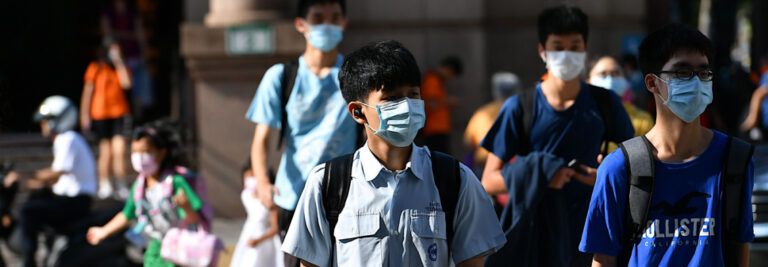Exchanges between the two sides of the Taiwan Strait continue to face restrictions imposed by the government in Beijing, and new measures that are being mulled in Hong Kong suggest that the situation could deteriorate in 2019, further hampering the ability of both societies to understand each other.
Signs of imminent new restrictions on bilateral exchanges are occurring amid an already chilled environment for academic exchanges, which have long served as an alternative conduit for the gathering of information, exchange of ideas, and messaging in times of tense relations in the Taiwan Strait. While visits to Taiwan by Chinese academics have not completely ceased since 2016, several interlocutors on the Taiwanese side have told this author that they have noticed a gradual muzzling of what their Chinese counterparts are willing to discuss when visiting Taiwan, with an increasing tendency to limit their remarks to the official line imposed by the Chinese Communist Party (CCP).
While ideology may account for the behavior of a number of hand-picked and CCP-approved Chinese academics, it is also clear that many are increasingly afraid of compromising their careers, not to mention their personal safety, should they depart from the zero-sum rhetoric that has become official policy under Xi Jinping. As a result, members of the Taiwanese academic community have found it increasingly difficult to obtain, through this type of exchanges, the kind of granular picture of Chinese society that they need in order to understand where China is going and what its government may be thinking. It is perhaps worth noting that academics worldwide have also noticed a marked reduction in the candidness of their Chinese counterparts in recent years, and more and more have found their interlocutors toeing Beijing’s official line and sounding more like ideologues bent on imposing a worldview that brooks no compromise.
Simultaneously, based on this author’s interviews, restrictions on the Taiwanese academics who are allowed to visit China have also been tightened, so much so that even a number of academics belonging to the “blue” camp (as referring to supporters or sympathizers of the Kuomintang Party, KMT), with a long track record of traveling to China, have recently been unable to do so, either as a result of their being “blacklisted” by a local government (e.g., Shanghai) or by the State Council’s Taiwan Affairs Office (TAO). Such blacklisting has been attributed either to the academics’ current affiliations with institutions that Chinese authorities regard as beyond the pale (e.g., those involved in democracy promotion) or to remarks the said academics are believed to have said which were deemed unacceptable (e.g., criticism of Xi’s policies in a public setting or a published article).
Although the leaderships in Taipei and Beijing continue to rely on trusted and inconspicuous aides to carry messages back and forth (the notion that the two governments have completely shut down communication since President Tsai Ing-wen’s inauguration in May 2016, ostensibly due to her refusal to acknowledge the so-called “1992 Consensus,” overstates the matter), the further limiting of free exchanges between the two sides at the academic and semi-official levels (e.g., track 1.5/2) risks exacerbating entrenched ideas that can lead to miscommunication and miscalculation, is ill-conducive to conflict resolution. Such restrictions also limit the ability of the leadership on both sides of the Strait to receive the kind of information from their advisers that they need to make enlightened policy decisions.
In the wake of the Sunflower Movement in March and April 2014, when Beijing already tightened its restrictions on the ability of Taiwanese academics to visit China, Hong Kong had often served as a “middle ground” or “neutral zone” where academics from the two sides could meet to exchange ideas more freely. However, Beijing’s accelerating erosion of “one country, two systems” since the Umbrella Movement, which also occurred in 2014 in Hong Kong, has undermined Hong Kong’s position as a safe ground for such meetings. Among other things, it has become increasingly clear that Beijing, rather than authorities in the special administrative region, has final say over immigration policy for the former British colony, and in recent years a number of Taiwanese academics, activists, and politicians, who until then had no problems entering Hong Kong, have seen their visas denied or been turned back at the border.
Now, amendments to the Fugitive Offenders Ordinance (逃犯條例) and the Mutual Legal Assistance in Criminal Matters Ordinance (刑事事宜相互法律協助條例) proposed by the Hong Kong Security Bureau on February 13 could have an additional chilling effect on the ability—and willingness—of Taiwanese to travel to the Special Administrative Region (SAR). The amendments, proposed in the wake of last year’s “suitcase murder,” in which a resident of Hong Kong was accused of killing his partner in a Taiwan hotel, is expected to be passed by Hong Kong’s legislature this summer. Once implemented, it could permit the arrest of Taiwanese crime suspects in the territories of Macau and Hong Kong and their extradition to China proper, where they would face prosecution and imprisonment.
This new development immediately brings to mind the case of Lee Ming-che (李明哲), the first Taiwanese national to be sentenced for the “crime” of subversion in China under the new National Security Law. Passed on July 1, 2015, the Law stipulates that preserving the national sovereignty and territorial integrity of the People’s Republic of China (PRC) “is a shared obligation of all the Chinese people, including compatriots from Hong Kong, Macao, and Taiwan.” Following revisions proposed to Hong Kong’s two aforementioned Ordinances, Taiwanese nationals accused of the crime of subversion—a category which by design has been loosely defined by the Chinese regime—could now be detained upon entering Hong Kong and sent to China to face prosecution. Given that the Law purports to cover the jurisdictions of Macau, Hong Kong, and Taiwan, the alleged crimes need not even have been committed on China proper for a suspect to be seized in Hong Kong and disappeared into the Chinese legal system. Consequently, any Taiwanese academic, activist, artist, or former politician accused of violating Chinese law (this includes anyone who advocates democracy or Taiwanese independence) would no longer need to be in China proper, as Lee did when he entered at Zhuhai, in Guangdong Province, to face prosecution in China; entering Hong Kong would be enough.
Furthermore, according to a version of the revision proposed by the Hong Kong Security Bureau, the temporary arrest and transfer of a suspect would be ordered by the chief executive of the Hong Kong SAR (HKSAR) government and would not be subject to usual reviews by the Legislative Council. The interpretative nature of the National Security Law, and the loose definition of the various “crimes” that can be committed against the state, empowers zealous officials to act preemptively; once a decision is made to detain the suspect of an ideological “crime,” it becomes very difficult for the system, and ultimately for the central authority in Beijing, to de-escalate, as this would constitute a loss of face. Such dynamics may very well account for Lee’s fate.
The ramifications of Beijing’s further clamp down on Hong Kong are hard to ignore: the one area where it remained relatively “safe” for Taiwanese and Chinese intellectuals to meet in the PRC will likely soon be turned into a zone where Taiwanese enter at their own risk. The next Lee Ming-che, as Hong Kong democracy activist Joshua Wong observed recently, could very well be nabbed in the former British colony.
The main point: Beijing is showing no sign of relaxing its strict control over exchanges between the two sides of the Taiwan Strait, and new regulations that could be implemented in Hong Kong this summer could make the situation even more dire for intellectuals.




